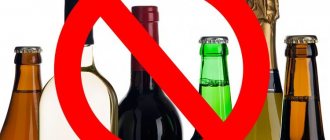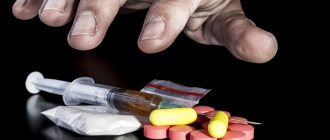Involving a minor in antisocial activities is a criminal offense. Such atrocities hinder the formation of a teenager’s personality, making him antisocial, preventing him from developing physically and spiritually. It is noteworthy that modern youth themselves strive to join real adult life by trying alcohol, narcotic drugs and psychotropic substances. If older comrades do not prevent such dangerous hobbies of the younger generation or actively encourage such actions, they become criminals and, therefore, are subject to criminal punishment.
Let's look at the key aspects of such atrocities.
Corpus delicti
An offense is considered committed when an adult, competent person has carried out actions that prompted a minor to drink alcohol. It does not matter whether the drinking took place.
Please note: The fine for selling alcohol to minors is provided by law in the amount of 30 to 50 thousand for individuals and from 300 to 500 thousand for legal entities. In addition, repeated violations result in criminal liability. The seller faces correctional labor for up to 3 years. Read more
The object of the crime is the physical and mental health of minors. The intent must be direct, that is, the guilty person consciously committed actions to involve a minor. Motives do not play a role in determining guilt, but may be taken into account when determining punishment.
Examples of involving minors in drinking alcoholic beverages include:
- Drinking alcohol in the presence of children with an offer to join them.
- Purchasing alcoholic beverages at the request of a child and then handing them over.
- Forcing people to drink alcohol using threats, blackmail, etc.
- Sale of alcohol to a minor at a retail outlet. Moreover, if the cashier was unable to correctly determine the age by appearance, this does not relieve him of responsibility and entails a fine.
The administrative and criminal code covers the involvement of children in drinking any alcohol, including homemade alcohol (wine, liqueurs, etc.), beer and low-alcohol drinks.
At what age is it legal to drink alcohol in Russia?
Many Russian teenagers and their parents think that minors over the age of 16 can freely drink alcohol.
The argument for this misconception is Article 20.22 of the Code of Administrative Offenses of the Russian Federation, which establishes liability for a teenager under 16 years of age being intoxicated and for drinking alcohol. Since this article does not say anything about minors aged 16 to 18 years, many believe that there is also no ban on drinking alcohol for this age category. However, this opinion is erroneous .
If we look at Article 16 of the Law “On state regulation of the production and turnover of ethyl alcohol, alcoholic and alcohol-containing products and on limiting the consumption (drinking) of alcoholic products,” we will see that the consumption (drinking) of alcoholic products by minors is not allowed in principle, regardless from where it happens.
Thus, it can be stated that the legal age for drinking alcohol in Russia is 18 years.
Administrative responsibility
Administrative liability for an offense occurs when the act does not have the characteristics of a criminal offense.
Article 6.10 of the Code of Administrative Offenses of the Russian Federation for drugging minors provides for the following penalties:
- An administrative fine in the amount of 1000 to 5000 rubles.
- An administrative fine in the amount of 4,000 to 5,000 rubles if the actions were committed by parents, guardians, legal representatives of the child, or persons entrusted with the functions of teaching and raising minors.
The exception is situations that fall under Article 6.18 of the Code of Administrative Offenses of the Russian Federation, namely when a coach or other sports medicine or physical education specialist is involved in the use of alcohol-containing products in order to increase the athlete’s athletic performance. Such an offense is punishable by disqualification for a period of up to three years.
Responsibility for the consumption of alcohol-containing and alcoholic products by minors
Responsibility for the consumption of alcohol-containing and alcoholic products by minors
Measures of administrative liability of adults for consuming alcoholic beverages in public places are regulated by Article 20.20 of the Code of the Russian Federation on Administrative Offenses (hereinafter referred to as the Administrative Offenses Code of the Russian Federation), the first part of which establishes that a fine is imposed for consuming alcoholic beverages in places not intended for this purpose. The list of places where the drinking of alcoholic beverages by minors and adults is prohibited is contained in Federal Law No. 171-FZ of November 22, 1995 and includes educational institutions, public transport and stops, markets and large gatherings of people, residential areas (elevators, entrances, parking lots) and rest.
When alcohol consumption in public places is carried out by minors under 16 years of age, the degree of responsibility is determined on the basis of Article 20.22 of the Code of Administrative Offenses of the Russian Federation. In this case, parents or other legal representatives of minors will bear responsibility under this article in the form of an administrative fine in the amount of one thousand five hundred to two thousand rubles.
Article 14.16 of the Code of Administrative Offenses determines the procedure for bringing to justice persons who violate the rules for the sale of alcoholic products. The sale of alcohol to minors is qualified under this article. If alcohol is sold to a teenager in a store, the seller, the director of the outlet, as well as the company or legal entity will be punished for the offense under the Administrative Code. The amount of recovery depends on the status of the seller:
for citizens in the amount of thirty thousand to fifty thousand rubles;
In addition to administrative punishment, for the sale of alcohol to children under 18 years of age, criminal liability is provided under Art. 151.1 of the Criminal Code of the Russian Federation, if a person has been repeatedly charged with such an administrative offense. These persons will face punishment in the form of a fine in the amount of fifty thousand to eighty thousand rubles or in the amount of wages or other income of the convicted person for a period of three to six months, or correctional labor for up to one year with deprivation of the right to hold certain positions or engage in certain activities. for a period of up to three years or without it. To avoid imprisonment or a large fine, sellers are allowed to require from buyers an identification card or other document that can prove age.
In the city of Slantsy in 2022, police officers brought 21 people under Art. 6.10 of the Code of Administrative Offenses of the Russian Federation, of which a mother was brought to justice for allowing her two-year-old daughter to try an alcohol-containing drink; three minors ended up in intensive care due to the consumption of ethanol, under Art. 14.16 of the Code of Administrative Offenses of the Russian Federation, three persons were brought to administrative responsibility, under Art. 151.1. The Criminal Code of the Russian Federation brought one person to criminal liability.
Source
Criminal liability
If a person over eighteen years of age involves a child in drinking alcohol-containing products systematically or with the use of violence and threats, then this falls under the scope of the criminal code, namely Article 151. Systematic use is considered to be such a frequency that it subsequently becomes addictive and causes addiction in a minor. painful dependence on alcohol.
A crime is considered committed based on the fact that an adult has completed actions aimed at systematically attracting a child to drink alcohol. The subject of the crime can be any individual over eighteen years of age.
However, please note that the law does not exempt minors from punishment if they voluntarily drink alcohol in public places. In this case, responsibility in the form of a fine will fall on the parents or the hooligans themselves (registration in the children's police room). Read more on our website https://lexconsult.online/7641-otvetstvennost-za-upotreblenie-spirtnogo-nesovershennoletnimi-detmi
So for the systematic drunkenness of minors, according to Art. 151 of the Criminal Code of the Russian Federation, the perpetrator faces punishment:
- Mandatory work within 480 hours.
- Correctional labor within one year.
- Arrest within six months.
- Imprisonment for a term of no more than four years.
If such a crime was committed by a parent or another person entrusted with educational functions (that is, there is improper performance of parental responsibilities), then the punishment may be as follows:
- Restriction of freedom for a term ranging from two to five years.
- Arrest within six months.
- Imprisonment for a term of no more than five years, while the offender may be limited in his rights to engage in certain types of activities for a period of up to three years.
In a situation where the perpetrator committed the above actions using force, the punishment will be imprisonment for up to six years.
When there is no liability
It is not always possible to prosecute an adult for drinking alcohol with a child . For example, parents who have lost opportunities for a real existence, have lost their living space, do not bear such responsibility (we are talking about homeless people).
The second important criterion is systematicity . If the incident of a child drinking alcohol was a one-time occurrence, there can be no talk of any serious response measures from the authorities.
Yes, the police can talk to violators and warn about responsibility, but when a case is first registered, the person is not held criminally liable; they can be held administratively liable (but these are rare cases).
After the first warning, fine and recording of repeated violations, we can talk about criminal consequences.
An example from judicial practice
Citizen L. approached the district police officer with a statement that in the neighboring apartment there was regular drinking of alcoholic beverages with a subsequent violation of public order. As a result of the inspection, it was revealed that citizen M was drinking alcohol with his friends. At the same time, while drinking alcohol, the brother of the culprit, who at that time was thirteen years old, was in the company. He, under the influence of his brother, also drank alcohol on a regular basis, which was confirmed by a medical report. The involvement of a minor in drinking alcohol by citizen M. was defeated by witness testimony. He was sentenced by the court to imprisonment for one year in accordance with Art. 151 of the Criminal Code of the Russian Federation.
What is the penalty for an adult for getting a minor drunk?
06/22/2018 | Nuts | no comments | 3983 |
My son is not yet 16 years old, he joined the company of older guys and began to regularly come home with the smell of alcohol. Several times I was even very drunk. I know the leader of that company. But he only brushes aside his parent’s notation. Do we have any responsibility for drugging a minor? What measures can be taken? Elena.
— This year, employees of the regional police department identified 589 people who involved minors in antisocial behavior. All of them were brought to administrative responsibility under Art. 17.4 (Involving a minor in antisocial behavior). This even means the fact of buying him alcoholic, low-alcohol drinks or beer, as well as involvement in the use of such drinks. The article provides for the imposition of a fine in the amount of 10 to 30 basic units,” said Victoria Lapshina, deputy chairman of the commission on minors of the Gomel City Executive Committee.
— I can also inform you about the completion of the preliminary investigation into two criminal cases initiated under Article 173 of the Criminal Code. They concern facts of systematic involvement of minors in antisocial behavior, which is punishable by arrest or imprisonment for up to three years. And the same action, committed with the use of violence, or by a parent, teacher or educator, is punishable by imprisonment for a term of one to five years.
Involving a minor in antisocial activities is a criminal offense. Such atrocities hinder the formation of a teenager’s personality, making him antisocial, preventing him from developing physically and spiritually. It is noteworthy that modern youth themselves strive to join real adult life by trying alcohol, narcotic drugs and psychotropic substances. If older comrades do not prevent such dangerous hobbies of the younger generation or actively encourage such actions, they become criminals and, therefore, are subject to criminal punishment.
Let's look at the key aspects of such atrocities.
Administration of Vikhorevsky urban settlement
For the involvement of a minor in the commission of antisocial actions, criminal liability is provided for in Article 151 of the Criminal Code of the Russian Federation.
Part 1 of Article 151 of the Criminal Code of the Russian Federation provides that the involvement of a minor in the systematic use of alcoholic beverages, intoxicating substances, vagrancy or begging, committed by a person who has reached the age of eighteen, is punishable by compulsory labor for a term of up to 480 hours, or correctional labor for a period of one years to 2 years, or arrest for a term of 3 to 6 months, or imprisonment for a term of up to 4 years.
Part 2 of Article 151 of the Criminal Code of the Russian Federation establishes that the same acts committed by a parent, teacher or other person charged with the responsibility of raising a minor by law are punishable by restriction of freedom for a period of 2 to 4 years, or by arrest. for a term of 4 to 6 months, or imprisonment for a term of up to 5 years with or without deprivation of the right to hold certain positions or engage in certain activities for a term of up to 3 years.
According to Part 3 of Article 151 of the Criminal Code of the Russian Federation, acts provided for in parts one or two of this article, committed with the use of violence or the threat of its use, are punishable by imprisonment for a term of up to 6 years with restriction of freedom for a term of up to 2 years or without it. Note. Article 151 of the Criminal Code of the Russian Federation does not apply to cases of involving a minor in vagrancy if this act was committed by a parent due to a combination of difficult life circumstances caused by the loss of a source of livelihood or lack of a place of residence.
Some types of involvement in antisocial actions are provided for in other articles of the Criminal Code of the Russian Federation, for example, involvement in the consumption of narcotic drugs or psychotropic substances (clause “a” of Part 3 of Article 230 of the Criminal Code of the Russian Federation), involvement in prostitution or coercion to continue prostitution (Part. 3, Art. 240 of the Criminal Code of the Russian Federation), etc. Therefore, the mere absence of a mention in Art. 151 of the Criminal Code of the Russian Federation of any type of antisocial actions does not mean that involvement in them is not a crime.
Administrative legislation also provides for liability for involving a minor in the use of alcohol and alcohol-containing products, new potentially dangerous psychoactive substances or intoxicants (Article 6.10 of the Code of Administrative Offenses of the Russian Federation).
Article 6.23 of the Code of Administrative Offenses of the Russian Federation provides for the responsibility of adults for involving a minor in the process of tobacco consumption.
Consideration of cases of administrative offenses provided for in Art. 6.10, Article 6.23 of the Code of Administrative Offenses of the Russian Federation is assigned to the jurisdiction of district (city) and city district commissions for the affairs of minors and the protection of their rights.
It should be noted that the involvement of a minor in the commission of an administrative offense is recognized by administrative legislation as a circumstance aggravating administrative liability (Article 4.3 of the Code of Administrative Offenses of the Russian Federation).
The influence of adults on minors has a high social danger, not only due to the significant harm caused to the normal development of the latter, but also because as a result of such influence there is a possibility of independent entry of minors who are most susceptible to outside influence on the criminal path. Moreover, the very methods by which they are involved in criminal activity are most often socially dangerous and illegal. The involvement of minors in committing crimes, as well as antisocial actions (in the systematic use of alcoholic beverages, intoxicants, in prostitution, vagrancy, begging) leads to deformation of the teenager’s personality and changes in his psyche.
To achieve criminal goals, adults skillfully, focusing on specific life situations, use such personal qualities of minors as suggestibility, pliability to persuasion and threats, lack of life experience, inability to critically evaluate the behavior of others and their own, falsely understood sense of camaraderie, solidarity, etc. P.
Criminal liability for involving a minor in committing a crime is provided for in Article 150 of the Criminal Code of the Russian Federation.
Involvement in the commission of a crime is the actions of an adult that are aimed at inciting the desire of a minor to commit active illegal actions. Such actions may be committed by a minor under the influence of promises, deception, threats or in any other way.
Another way of involving a minor in committing a crime is associated with inciting envy, revenge, base motives, emphasizing his mental or physical inferiority in relation to the person at whom the criminal actions are directed.
An adult who involves a minor in committing a crime is liable both under the commented article of the criminal code and for the crime in which the minor was involved.
The mere involvement of a minor in the commission of a crime does not mean that the minor committed this crime. Involvement is considered completed from the moment it takes place, i.e. when the teenager consented to commit a crime.
The subject of this crime can be a person over 18 years of age.
It should be noted that committing a crime while a minor leaves a negative imprint throughout
the fate of a minor, affects the nature of his subsequent relations with the law, disrupts the normal process of development of a person’s personality, contributes to the formation and consolidation in his mind of a certain negative social attitude.
Taking into account the above, the responsibility of an adult under Part 1 of Article 150 of the Criminal Code of the Russian Federation provides for punishment of up to 5 years in prison for involving a minor in committing a crime through promises, deception, threats or in any other way.
In accordance with Part 2 of Article 150 of the Criminal Code of the Russian Federation, the same acts committed by a parent, teacher or other person charged with the responsibility of raising a minor by law are punishable by imprisonment for up to six years with deprivation of the right to hold certain positions or engage in certain activities. activities for a period of up to three years or without it.
Part 3 of Article 150 of the Criminal Code of the Russian Federation provides that crimes of Part 1, Part 2 of this article, committed with the use of violence or with the threat of its use, are punishable by imprisonment for a term of 2 to 7 years with restriction of freedom for a term of up to two years or without it.
Part 4 of Article 150 of the Criminal Code of the Russian Federation established that the acts provided for in parts 1, 2, or 3 of this article related to the involvement of a minor in a criminal group or in the commission of a serious or especially serious crime, as well as in the commission of a crime based on political, ideological , racial, national or religious hatred or enmity, or based on hatred or enmity against any social group, are punishable by imprisonment for a term of 5 to 8 years, with or without restriction of freedom for a term of up to 2 years.
In contrast to the involvement of a minor in the commission of a crime, his involvement in the commission of antisocial actions has the qualifying sign of repetition. Repeated involvement in the commission of these actions is characterized by the fact that they can be committed against the same minor (first, involvement in the systematic use of alcoholic beverages, and then in prostitution).
The list of types of antisocial behavior (actions), the involvement of which entails criminal liability for an adult, is exhaustive.
Basic provisions
According to the norms of current legislation, the term “involvement” refers to situations where adults intentionally create conditions when antisocial acts are committed by minors or the preconditions for such activities are created. For example, parents treat their child to beer, mistakenly believing that a small dose of weak alcohol will not cause harm.
However, involving minors in drinking alcohol is not the only antisocial act. Adults can force a child to beg, entice him into prostitution, or get him hooked on illegal drugs.
All of the listed offenses fall under Article 151 of the Criminal Code, which outlines penalties for involving persons under the age of majority in anti-social activities.
Important! The article provides an exhaustive list of antisocial acts, therefore, involving a teenager in gambling or involving him in committing other administrative violations does not imply liability under Article 151 of the Criminal Code of the Russian Federation. Download for viewing and printing:
Article 151 of the Criminal Code of the Russian Federation “Involving a minor in committing antisocial actions”
Varieties
Let's look at exactly what acts are considered antisocial and give a brief definition of each point.
Begging
This assumes situations where a minor begs strangers for money, food, things and other items of financial value.
Vagrancy
Situations when a teenager leads a nomadic lifestyle, constantly moving within a certain territory or area, or wandering between populated areas. If this happens over a long period of time, the teenager may develop persistent problems with adaptation in society.
It is noteworthy that whether the little tramp has a permanent place of residence or the lack thereof does not play a significant role.
Drinking alcohol-containing products
This refers to the repeated abuse of alcoholic beverages by adolescents, which can provoke persistent alcohol dependence.
For the crime under Article 151 of the Criminal Code of the Russian Federation, it does not matter at what time minors are involved in systematic drunkenness: educational or free. In addition, the fact of consumption itself is not taken into account: an adult only needs to repeatedly offer alcohol to a child, and even if the latter refuses, the offender will end up in the dock.
Use of intoxicants
This refers to mind-stupefying substances that cause a state close to alcoholic intoxication. This may include some medicines, household chemicals, a mixture of alcohol with intoxicating components, for example, diphenhydramine, ether, barbiturates.
Important! If the involvement of minors in vagrancy is provoked by a difficult life situation or lack of means of subsistence, the situation does not constitute a criminal offense, provided that the involvement occurs at the request of the parents.
Alcoholic drinks - the essence of the concept
Alcoholic drinks that have a negative impact on the formation and development of a growing teenager’s body include:
- Alcohol products in the production of which ethyl alcohols are used.
- Ethyl drinking alcohol is alcohol with drinking water. The maximum proportion of ethyl alcohol is 95%.
- Wine – drinks that contain wine materials and alcohol (no more than 22%).
- Other alcoholic drinks - alcohol that is not on the above list, including vodka.
There is also a crime when imposing the use of other intoxicating substances that cloud the mind, leading to a loss of clarity of what is happening (acetone, gasoline, glue).
What constitutes a crime
Such offenses are characterized by a formal composition, and the crime is considered committed from the moment of an attempt to involve a minor in antisocial acts falling under the provisions of the article in question of the Criminal Code.
Objective side
Involves the involvement of adolescents in antisocial activities.
An object
The personality of the victim, his health and moral formation.
Subjective side
Direct intent aimed at committing illegal actions.
Subject
Any citizen over 18 years of age.
Responsibility measures
According to the provisions of Article 151 of the Criminal Code of the Russian Federation, those guilty of involving minors in antisocial activities may face the following types of punishment:
- crime without aggravating features: compulsory labor for up to 480 hours, correctional labor for 12-24 months, arrest for up to six months or imprisonment for up to 4 years;
- committed by a teacher, parents or other persons on whom the victim is socially dependent: arrest for up to six months, imprisonment for up to 5 years, restriction of freedom of movement for 2-4 years, ban on teaching for 3 years;
- committed with the use of violence or the threat of its use: up to 6 years in prison.





